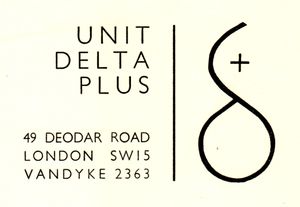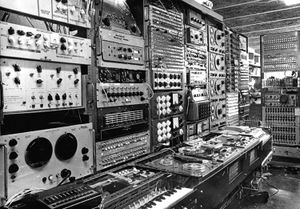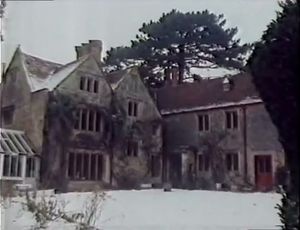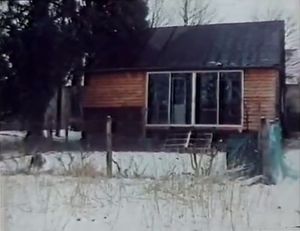Unit Delta Plus
In 1966, Delia and Brian Hodgson joined Peter Zinovieff to form Unit Delta Plus, an electronic music studio in Zinovieff's "garden shed by the river in Putney."[1]
Unit Delta Plus also delivered lectures about electronic music. After one at Morley College in London, David Vorhaus introduced himself to Derbyshire and Hodgson after the lecture.[2]
On the 10th September 1966, Unit Delta Plus gave a Concert of Electronic Music at the Watermill Theatre in Bagnor.Cite error: Closing </ref> missing for <ref> tag starting the computer to perform Peter Zinovieff's Partita for Unattended Computer at the Queen Elizabeth Hall on 15th January 1968.[3] The first piece of the same concert was her own composition Pot Pourri.[3]
In 1967, after a troubled performance at the Royal College of Art, the unit disbanded.[4] Brian Hodgson says of this event:
“Unit Delta Plus had another lecture at the Royal College of Art, however “Peter had arranged a 'happening' [not a lecture] but didn’t tell Delia or I. I walked off the platform and sat in the audience at one point. And the next day, we went over [to Peter's house] and said we wanted to break up the partnership and he said he wanted to do it as well, so that was it.”[5]
Pieces
Public performances
- The Business of Good Government, 16th-18th December, 1965
- On The Level, 25th? February 1966
- Unit Delta Plus Concert of Electronic Music, 10th September 1966
- Million Volt Light and Sound Rave, 28 Jan and 4th February 1967
- The RSC’s Macbeth in Stratford on Avon,[5] opening 15th August 1967
- Delia's Pot Pourri, performed as part of a concert at the Queen Elizabeth Hall, London on the 15th January 1968[3]
References
- ↑ Sofka Zinovieff, Red Princess: A Revolutionary Life, London: Granta, 2007, ISBN 9781862079199, pp. 327-28.
- ↑ The Radio Scotland interview
- ↑ 3.0 3.1 3.2 Francis Routh, Contemporary British Music: The Twenty-Five Years from 1945 to 1970 (1972), Chapter 20: Electronic music and the Avant-garde: Electronic Music
- ↑ Article "Brian Hodgson" at last.fm
- ↑ 5.0 5.1 Breege Brennan's thesis




